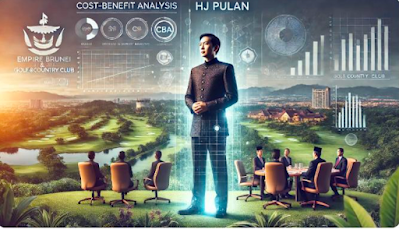Brunei’s Vision 2035 aspires to a bright future, but challenges like unemployment, informal work, and job market mismatches tell a different story. Explore the realities behind the vision and the steps needed to turn ambitions into opportunities for all.
By Malai Hassan Othman
Brunei Darussalam is a nation with a grand vision - Wawasan Brunei 2035 - which promises a future of highly skilled citizens, a diversified economy, and a world-class quality of life.
Yet, as the nation approaches 2035, the cracks in this vision are becoming hard to ignore.
Beneath the polished rhetoric lies a labour market grappling with systemic challenges: 11,700 unemployed individuals, 100,087 informal workers, and 3,000 to 4,000 graduates entering the workforce annually, only to face limited job opportunities.
This narrative reveals not just statistics but the real lives of graduates trapped in low-wage jobs, workers enduring the instability of informal employment, and families struggling with stagnant incomes.
Although efforts have been initiated, observers and experts caution that without significant shifts in governance and economic policy, Brunei's aspirations may be overshadowed by stark realities.
Lofty Aspirations
At its core, Wawasan Brunei 2035 envisions a nation characterized by:
· Highly educated and skilled citizens
· A dynamic and sustainable economy
· A high standard of living for all
The Manpower Blueprint aims to bring this vision to fruition, outlining strategies to create a future-ready workforce. These strategies focus on:
· Aligning education programs with industry needs
· Strengthening collaboration between government and private sectors
· Promoting local employment and reducing dependence on foreign labour
· Diversifying the economy beyond oil and gas to sectors including technology, tourism, and agriculture
These aspirations have been a recurring theme in His Majesty the Sultan and Yang Di-Pertuan of Negara Brunei Darussalam, Sultan Haji Hassanal Bolkiah’s titah.
His Majesty has consistently stressed the urgency of addressing Brunei’s labour market challenges, emphasizing:
· Ensuring education programs provide graduates with skills relevant to market demands
· Strengthening partnerships between the public and private sectors to foster sustainable job opportunities for Bruneians
· Encouraging businesses to prioritize hiring Bruneians over foreign workers, thereby uplifting the nation’s workforce
· Accelerating efforts to diversify the economy, reducing dependency on oil and gas while creating opportunities in emerging industries.
These themes highlight the government’s acknowledgement of the need for transformative action.
However, the realities of Brunei’s labour market underscore a significant gap between aspiration and achievement.
The next step is to translate these articulated ambitions into tangible change.
The Bleak Reality of Unemployment: The Human Toll
The statistics are sobering. In 2023:
· 11,700 individuals aged 18 and older are unemployed, reflecting a 5.1% unemployment rate, a slight increase from 5.0% in 2022.
· Among these, 4,000 are youth aged 18 to 24, many of whom are graduates struggling to find meaningful employment.
· 7,700 are adults aged 25 and above, some having spent years searching for stable work.
· Brunei produces 3,000 to 4,000 new graduates annually, yet 56% of these graduates come from oversaturated fields like ICT and business administration, resulting in a "skills mismatch" where qualifications do not align with market demands.
Take Rahim, a 25-year-old ICT graduate: "After graduating, I spent a year applying for jobs and got nothing. I’m now doing part-time freelance web design. It’s not enough to build a career, and it’s hard to save for my future."
Informal Employment: A Growing Concern
In 2021, Brunei’s informal workforce surged to 100,087 workers, up from 86,660 in 2020. These roles encompass gig work, small-scale trading, and domestic labour.
Informal jobs lack contracts, benefits, and job security, leaving workers vulnerable to uncertainty and exploitation.
Siti, a 29-year-old single mother, juggles informal catering jobs: "I cook and sell food online, but if I fall sick, I don’t earn anything. I can’t afford insurance or even think about saving for my kids' education."
Stagnating Wages
For those fortunate enough to secure formal employment, wages remain stagnant.
The average monthly income fell to BND 1,758 in 2023, down from BND 1,793 in 2022. Non-local workers earn even less, averaging BND 1,271.
Meanwhile, rising living costs continue to pressure Bruneian households.
The Problem with Playing It Safe
Observers note that prudent spending and short-term fixes have characterized Brunei’s governance, hindering progress.
"Prudence is important, but over-caution can lead to paralysis," remarked a regional economist.
"Brunei needs to transition from merely maintaining fiscal stability to making bold, strategic investments in its people and economy."
Economic analysts warn that this "budgeting mentality" results in missed opportunities.
Initiatives like apprenticeship programs (e.g., i-Ready) are well-intentioned but do little to address structural unemployment, serving instead as temporary relief for young job seekers.
The Way Forward: Expert Insights
Labour analysts and independent experts propose several strategies to align Brunei’s labour policies with its ambitions under Wawasan 2035:
1. Shift from Prudent Spending to Smart Investments
· Upskilling the Workforce: Invest in training programs that equip workers with skills for emerging sectors such as renewable energy, digital technologies, and green industries.
· Support Startups and MSMEs: Provide grants, low-interest loans, and tax incentives to drive private sector innovation and job creation.
· Economic Diversification: Accelerate development in non-oil sectors such as tourism, agriculture, and ICT. "Brunei must take calculated risks," stated a labour expert. "Investing in high-growth sectors will create jobs and future-proof the economy."
2. Strengthen Public-Private Collaboration
Experts emphasize enhancing synergy between government and private businesses:
· Partner with private companies to design education curricula that meet industry needs.
· Establish incentives for businesses that prioritize hiring Bruneians over foreign workers.
· Promote entrepreneurship by offering mentorship and funding programs for young innovators.
3. Formalize Informal Work
Labour experts argue that formalizing informal roles is crucial for building a stable workforce:
· Simplify registration processes for small businesses and gig workers.
· Offer incentives, such as access to health insurance and retirement benefits, to encourage formalization.
4. Align Education with Market Needs
Addressing the skills mismatch is essential for reducing unemployment. Experts suggest:
· Expanding vocational training for fields like advanced manufacturing, logistics, and renewable energy.
· Improving career guidance to help students select fields with strong job prospects.
· Enhancing technical and vocational education training (TVET) programs.
A Moment of Reckoning
Brunei’s labour market stands at a crossroads. With 11,700 unemployed individuals, 100,087 informal workers, and 3,000 to 4,000 graduates entering the workforce annually, the status quo is unsustainable.
Experts warn that without decisive action, Brunei risks falling behind in an increasingly competitive global landscape.
The time to act is now. With smart investments, bold leadership, and a concerted effort from both the public and private sectors, Brunei can still turn its aspirations into reality - ensuring a future where all Bruneians can thrive. (MHO/01/2025)



.jpeg)







